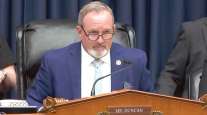PHMSA Seeks to Eliminate Requirements for Special Permits to Haul Certain Hazmats
This story appears in the Aug. 2 print edition of Transport Topics.
The Pipeline and Hazardous Materials Safety Administration has proposed a rule that would eliminate requirements for special permits to haul some hazmats, ranging from liquefied petroleum gas to anhydrous ammonia fertilizers.
A special permit allows carriers and shippers to package or ship a hazardous material in a manner that is not authorized by hazmat regulations. PHMSA said the proposed rule would eliminate the need to obtain thousands of special permits because the hazmats in question have been safely transported for years, sometimes even decades.
“Incorporating these special permits into the hazmat regulation would eliminate the need for over 10,000 current grantees to reapply for the renewal of six special permits every four years and for PHMSA to process the renewal applications,” the proposed rule said.
The proposal includes six specific types of hazmat transport by cargo tank carriers. The hazmats authorized by the proposed rule include liquefied petroleum gas, liquid soil pesticide fumigants, road-striping materials and anhydrous ammonia fertilizers.
Public comment is being accepted until Aug. 20.
John Conley, president of National Tank Truck Carriers, said the special permits have in the past “gotten PHMSA into trouble,” and that the proposed rule was likely a response to the criticism the agency has received.
“It cleans the regulations up a little bit, and I think we’re going to see a whole lot more of it,” Conley told Transport Topics. “There are still thousands of special permits out there. But it’s a positive development all the way around.”
Conley added, “We’re certainly not going to oppose what they’re doing, because it makes sense and we’d like to see more of it. I just question if you’re going to include it in the regulation, why would you leave things in like for agriculture use or only for private carriers. If it’s safe for a private fleet, it’s certainly safe for a common carrier.”
A PHMSA spokeswoman did not return a message for comment.
PHMSA was sharply criticized last September during a House Transportation Committee hearing for what some members of Congress called a “pervasive pattern of regulatory abuse and neglect.”
Investigations by the committee and the Department of Transportation’s inspector general concluded that PHMSA “almost never” turned down requests for special permits to transport hazmats that normally would be prohibited by federal regulations.
Although some members of the committee said the hazmat hauling industry has a sterling safety record, the committee’s probe said that from 2007-2009 the agency approved 4,792 applicants for special permits, rejecting only 2% of the requests — mostly because of incomplete or deficient application paperwork.
“The PHMSA culture appears plagued by a belief that the agency should make things as easy as possible for the industry it should be regulating,” House Transportation Committee Chairman Rep. James Oberstar (D-Minn.) said during last year’s hearing.
A spokeswoman for the transport committee declined to comment on the proposed rule. “After we review it, we will likely have follow-up questions for PHMSA before commenting,” she said.




